#latin epigram
Text
philaenis from martial’s epigrams is my dream woman
4 notes
·
View notes
Text

This poem is a bit different. This is a Latin epigram written by my American friend, Ιουστίνος.
0 notes
Text
Latin Literature Tournament - Round 1
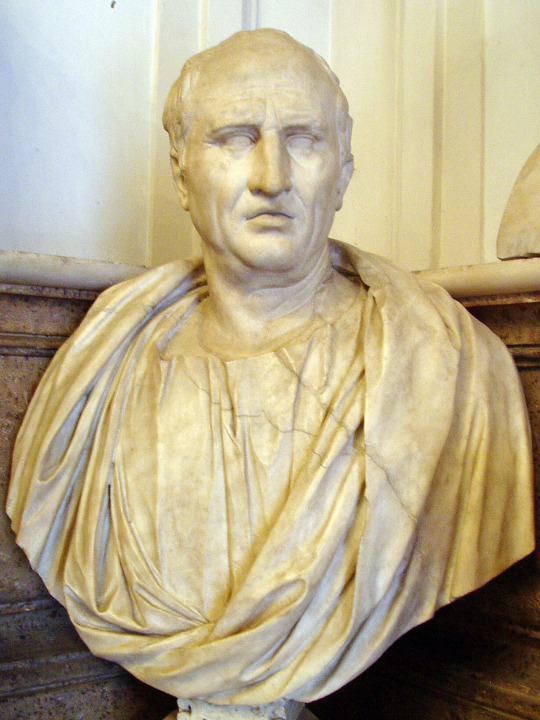
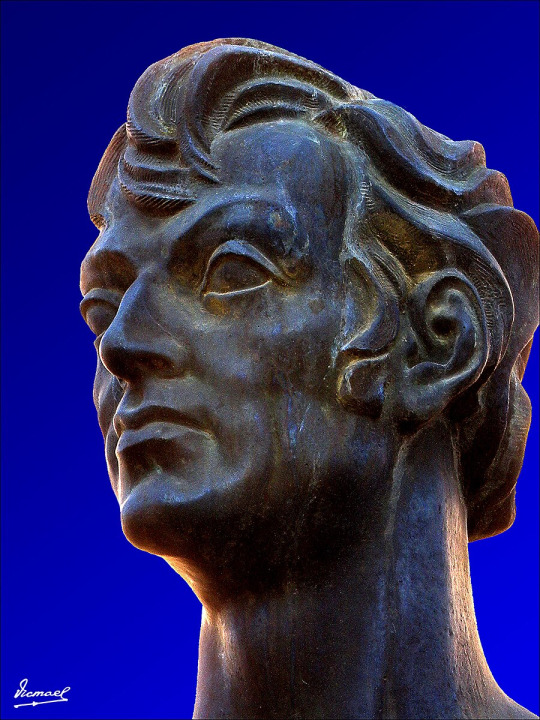
Propaganda under the cut!
Cicero Propaganda:
This is literally the Cicero Website! You're gonna be on Classics Tumblr and not vote for him??
He saved the republic, you know
All kidding aside, he genuinely wrote some of the most marvelous prose in the Latin language
Martial Propaganda:
Dude basically invented the modern epigram
Was a Huge Bitch and could sling trash talk like no other. A funnier motherfucker you will never meet
Additional propaganda from his dear friend Pliny
#tagamemnon#cicero#martial#latin literature tournament#tournament poll#bracket#classics#ancient rome#epigram#rhetoric#tumblr polls
82 notes
·
View notes
Text
Death of a Charioteer
Martial, Epigrams X.53
I am the famous Scorpus, glory of the shout-filled Circus,
Source of your clapping, Rome, and your brief delight;
Envious Lachesis snatched me away at twenty-seven--
Counting my victories, she thought me elderly.
Ille ego sum Scorpus, clamosi gloria Circi,
Plausus, Roma, tui deliciaeque breves,
Invida quem Lachesis raptum trieteride nona,
Dum numerat palmas, credidit esse senem.

Mosaic depicting a charioteer of the albata (White) faction, one of the four factions that dominated Roman chariot racing, with his horse. Artist unknown; 1st half of 3rd cent. CE. From the Villa dei Severi, Baccano; now in the Palazzo Massimo alle Terme, Rome.
#classics#tagamemnon#Latin#Latin language#lingua latina#translation#Latin translation#poetry#poetry in translation#Roman poetry#Ancient Rome#Roman Empire#Martial#epigram#elegiac couplets#ancient athletics#chariot racing
87 notes
·
View notes
Text
difficilis facilis, iūcundus acerbus es īdem:
nec tēcum possum vīvere, nec sine tē.

unbearable and agreeable, you are both pleasant and bitter in equal measure:
I can neither live with you, nor without you.
#this is martial epigrams 12.46 btw#we were studying it and I was like. omg#shoutout to runner-up in the macdennis roman poetry competition: catullus poem 85!!#aka odi et amo#macdennis#iasip#sunny#it’s always sunny in philadelphia#latin literature#latin#martial#roman literature#latin poetry#roman poetry
16 notes
·
View notes
Text
I did an English translation of Poem 104 from Book 11 of Martial's Epigrams. I think it's quite good
it is however rather NSFW (like, smuttily so) and therefore may be found under the cut
"Dear Wife"
Martial 11.104
Honey, it's my way or the highway:
I'm not Curius, Numa, or Tatius.
I like nights that stretch into drinking and fun:
You’ve had your water, you get mopey and can't wait to leave.
You want the dark: I like to play in full view of the lamp
And let its rays illuminate my form.
Cloths and clothes and modest robes cover you:
But a girl can’t get nude enough for me.
I adore hot steamy kisses:
You give me the kind you’d give your grandma in the morning.
You don't deem the deed worthy of moving, or help out by moaning
Or fingering yourself; you fuck like you're preparing wine and incense:
Trojan servants used to start wanking outside the door
Every time Andromache sat on Hector’s cock and rode him,
And even while Ulysses snored, faithful Penelope used to
Always have her hand on her sweet spot.
You won't let me fuck you in the arse: Cornelia let Gracchus,
Julia let Pompey, and didn't Portia let you, too, Brutus?
Before that particular attendant started mixing sweet wine for him
It was Juno who let Jupiter Ganymede her!
If you want respectability, you can be
Lucretia all day: at night I want Lais.
Uxor, vade foras aut moribus utere nostris:
non sum ego nec Curius nec Numa nec Tatius.
Me jucunda juvant tractae per pocula noctes:
tu properas pota surgere tristis aqua.
Tu tenebris gaudes: me ludere teste lucerna
et juvat admissa rumpere luce latus.
Fascia te tunicaeque obscuraque pallia celant:
at mihi nulla satis nuda puella jacet.
basia me capiunt blandas imitata columbas:
tu mihi das aviae qualia mane soles.
Nec motu dignaris opus nec voce juvare
nec digitis, tamquam tura merumque pares:
masturbabantur Phrygii post ostia servi,
Hectoreo quotiens sederat uxor equo,
et quamvis Ithaco stertente pudica solebat
illic Penelope semper habere manum.
Pedicare negas: dabat hoc Cornelia Graccho,
Julia Pompeio, Porcia, Brute, tibi;
dulcia Dardanio nondum miscente ministro
pocula Juno fuit pro Ganymede Jovi.
Si te delectat gravitas, Lucretia toto
sis licet usque die: Laida nocte volo.
10 notes
·
View notes
Text
Epigrams by Martial: Book 11, Epigram 93
youtube
Read more at my Wordpress blog.
#epigrams by martial#epigrams#martial#epigrammata#marcus valerius martialis#ancient rome#latin#shorts#bad luck#fire#muse#poet#poetry#punishment#target#ancient roman literature#non sims#Youtube
2 notes
·
View notes
Note
Trick-or-Treat! I have come knocking on your Tumblr door asking for a treat. You can answer with a meme, a bit of art/fic, a fic recommendation, pictures of candy, or something else! Then go to your mutual’s Tumblr door and ask them for a treat! Happy Halloween! 🎃👻
Oh! Happy Halloween ^^
As a treat, I would like to present you with a latin burn from Martial's Epigramms 2,42; transl. & ed. Barié/Schindler:

Unten pfui und oben pfui:
Zoïlus, was verunreinigst du das Wasser im Becken, indem du deinen Hintern darin wäschst?
Damit es noch schmutziger wird, tauche, Zoilus, deinen Kopf hinein!
5 notes
·
View notes
Text
Don't Remind Me...
Memento mori?
My reply:
Quomodo possumus oblivisci?
--Aaron Nydegger
3 notes
·
View notes
Text
Martial Translation
I am doing a translation project in college and one of the epigrams I translated did not have a widely-available translation (7.35) so I figured I would put it here. It's not the best but it is something.
Do the groins of the slaves, tucked up by black leather, stand for you,
as often as you refreshed yourself in the water?
But my Daughter, to shut up about myself, Laecania, The slaves have the burden of the Jews under their naked skin,
but young women and old women bathe naked with you.
Or is slave dick alone your truth?
Maybe the wife attained a woman’s retreat,
And your secret, cunt: do you wash in the water?
6 notes
·
View notes
Text

Statue of Apollo 'Lizard Killer' Found at Etruscan and Roman Spa
Archaeologists have found a marble statue of Apollo Sauroctonos, also known as the “Lizard Killer”, during excavations of an Etruscan and Roman spa at San Casciano dei Bagni in Tuscany.
The spa is fed by geothermal springs, which the Etruscans used to supply water at a mean temperature of 42 °C (108 °F) to the complex of Balnea Clusinae.
According to legend, the site was founded by Porsenna, an Etruscan king of Chiusi, although archaeologists suggest that the complex was built by the Etruscans in the third century BC.
During the Roman period, the spa became a popular attraction for the therapeutic benefits, with notable figures such as Caesar Augustus being a frequent visitor.


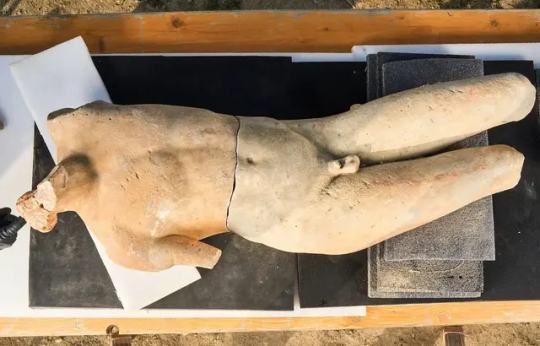
Archaeologists have found fragments of a life-sized Apollo Sauroctonos statue on the edge of the Great Bath, which are Roman copies of a bronze statue created by the Greek sculptor Praxiteles, the most renowned of the Attica sculptors of the 4th century BC.
Example copies generally date from the 1st to 2nd century AD and depict Apollo in his youth about to catch a lizard climbing up a tree. The Roman poet, Martial, wrote an epigram about the Apollo Sauroctonos statues “Spare the lizard, treacherous boy, creeping toward you; it desires to perish by your hands.”


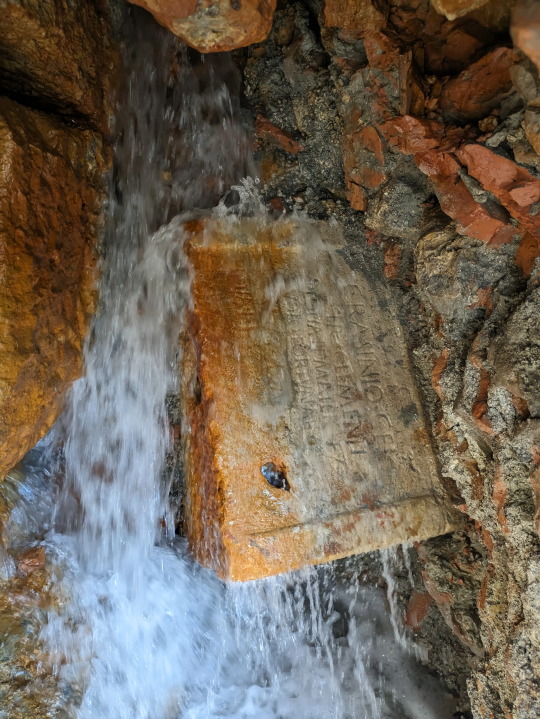
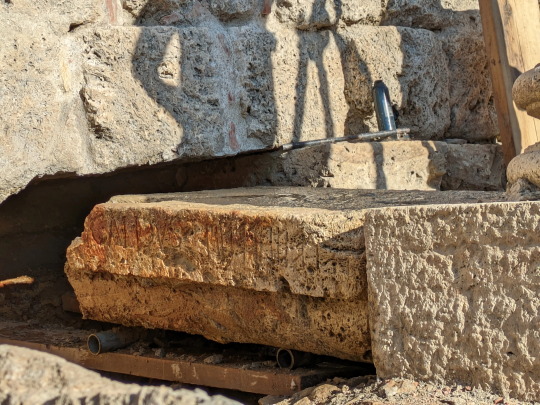
Apollo, revered as the deity associated with healing and ailments, received votive offerings from petitioners seeking remedies for their afflictions. Additionally, the depiction of Apollo hunting a lizard can be associated with ophthalmology, as lizards were considered a key ingredient for curing eye complaints.
Excavations also uncovered a travertine votive altar with a bilingual inscription in Latin and Etruscan from the 1st century AD, indicating the ongoing influence of Etruscan culture well into the Roman Imperial Era.
By Mark Milligan.



#Statue of Apollo 'Lizard Killer' Found at Etruscan and Roman Spa#San Casciano dei Bagni in Tuscany#statue#sculpture#ancient artifacts#archeology#archeolgst#history#history news#ancient history#ancient culture#ancient civilizations#roman history#roman empire#roman art#ancient art
129 notes
·
View notes
Text
Rating all the Latin authors I've read in the past two years in honor of my oral Latin exam tomorrow
Caesar (De Bello Gallico)
This is a weird one because while his prose isn't extremely difficult, it was also the first unedited work I read, so for lil 15-year-old me, this was very difficult. But I learned a lot from Caesar (especially that he made it an art to making his sentences as long as possible. We read an entire 200 words, and IT WAS JUST ONE SENTENCE.), and the sense of nostalgia while rereading it is very pleasant, so I will give you a solid 6/10
Pliny the Younger (Epistulae)
Mixed feelings about this one again. This could also be just because I despise prose. I really do not like it at all. Pliny's epistulae were pretty okay. I liked them a little better than Caesar's because of their variety (for those that don't know, epistulae means letters). His letter about the Vesuvius was a lot of fun to translate, even with all the hyperbata, but his letters about or to his third wife were very uncomfortable. Like, I get things were different back then. BUT YOU WERE 45, PLINY. 45. SHE WAS WHAT? 14? 15 TOPS? MY GOD. THAT'S A BIGGER AGE DIFFERENCE THAN I HAVE WITH MY FATHER.
7/10
Ovid (Metamorphoses)
Ovid is life Ovid is love. He was the one who introduced me to Latin poetry, and I will always love him for it. He was an icon and a legend. The poems of his that we read (Daedalus & Icarus, Latona and the Lycian peasants, Diana and Actaeon) were all bangers, and I love them all to death. I never wanted to go back to reading prose after this (but unfortunately, I will have to next year. ew)
11/10 (I love you, Ovid)
Vergil (The Aeneid)
*deep sigh* Listen. I love his complex works, and I have great respect for this poem but by the GODS. Vergil's poetry is the most difficult I've had to translate by a long shot. He made me rethink my entire career in Latin. I have considered quitting so many times because of this man. I felt like a complete idiot most of the time. This is not a guy to fuck with. Luckily I got through it on my finals (barely.) but Christ alive this man made my life difficult.
5/10
Horatius (Satires and Odes)
Horatius will always have a special place in my heart. We read his poetry right after Vergil's, and it almost completely restored my faith in my abilities. He's just my little guy and I have fond memories of translating his works. We still know many Latin phrases that he wrote (Carpe Diem being the most famous. Hello, DPS fandom). Also, he and Vergil were most definitely in love. I don't make the rules. I have evidence if you want me to elaborate.
9/10
Catullus (love poems)
Ah, Catullus. Horny poet of the year. Had a wild affair with an older married woman. Nepotism baby. Sappho stan. Didn't know how to budget, but we aren't holding that against him. Just wanted to write poetry and dance (who doesn't, honestly). Gave fuck-all about education. Wrote nearly all of his poetry about the older woman he had an affair with. Might I add that this woman was married to one of his father's bestest buddies? Yeah. Icon. Here's a kid's choice award.
8/10
Martialis (Epigrams)
This dude had ZERO chill. Roasted everyone in the city. Literally, no one is safe. Wasn't afraid to call people out by their real names. Some people allegedly committed suicide after being roasted by this guy. Translating his epigrams gave me more joy than hearing we had seen the end of Vergil. His humour may be a little silly now, but I will not accept any Martialis slander on my blog.
10/10
And that is all folks
#latin student#latin memes#latin literature#publius ovidius naso#classics#ancient greek#martialis#how is that not a tag#this guy is the epitome of Tumblr humour#pliny the younger#pliny#julius caesar#roman history#roman literature#catullus#vergil#the aeneid#vergil and horatius were gay and in love pass it on#horatius
54 notes
·
View notes
Note
hello!!! as a recent classics graduate, i really enjoy your posts and the snippets you share about your teaching. i love reading and translating latin and attic greek, but i work a 9-5 job now that leaves me mentally drained by the end of the day. do you have any tips or advice for how to keep up with these languages? should i spend time on something as small as one sentence per day, or should i dedicate larger chunks of time on the weekends?
thanks again for all of your lovely posts! :)
you really have to figure out what works for you! i don't really dedicate any specific amount of time to it because that stresses me out lol, but if you need that sort of motivation than you can definitely give it a shot
i find that working in larger chunks when i can works best for me, because i can get into the zone and not feel like im constantly starting and stopping. though one of my favorite things to do if im short on time is translate epigrams, because theyre self contained and i can get through them quick.
45 notes
·
View notes
Text
The task of a marginalia maven is at right angles to the task of reading a book: It is an attempt to read the reader rather than to read the writer. For several decades now, scholars have been swarming the margins of books in dead people’s libraries. Those margins are among the most promising sites of “textual activity,” to use the scholar’s clinical phrase—a place to explore, analyze, and, it is hoped, find new raw material for the writing of dissertations. Famous readers whose libraries have fallen under such scrutiny include Melville and Montaigne, Machiavelli and Mark Twain.
A book invites various kinds of engagement, depending on the reader. Voltaire (whom Nixon admired, to judge by his extravagant underlining in the Durants’ The Age of Voltaire) scribbled commentary so incessantly that his marginalia have been published in volumes of their own. Voltaire liked to argue with a book. Nixon did not. He had a lively mind but not, when reading, a disputatious one; he restricted his marginalia almost exclusively to underlining sentences or making other subverbal marks on the page—boxes and brackets and circles. You get the idea that he knew what he wanted from a book and went searching for it, and when he found what he wanted, he pinned it to the page with his pen (seldom, from what I’ve seen, a pencil).
In his method, Nixon resembled the English writer Paul Johnson. I once asked Johnson how, given his prolific journalistic career—several columns and reviews a week in British and American publications—he managed to read all the books he cited in his own very long and very readable histories, which embraced such expansive subjects as Christianity, ancient Egypt, and the British empire. His reaction bordered on revulsion at my naivete. “Read them?!” he spat out. “Read them?! I don’t read them! I fillet them! As it happens, Nixon was an avid reader of Johnson, whose books he often handed out to friends and staff at Christmastime.
John Adams, another busy producer of marginalia, liked to quote a Latin epigram: Studium sine calamo somnium. Adams translated this as: “Study without a pen in your hand is but a dream.” Nixon acquired the pen-in-hand habit early, as his surviving college and high-school textbooks show, and he kept at it throughout his life. For Nixon, as for the rest of us, marking up books was also a way of slowing himself down and attending to what he read. He was not a notably fast reader, by his own account, but his powers of concentration and memorization were considerable. Going at a book physically was a way of absorbing it mentally.
Go ahead! Mark up your books! Historians will love you for it someday.
5 notes
·
View notes
Text
Epigrams by Martial: Book 5, Epigram 83
youtube
Read more at my Wordpress blog.
#epigrams by martial#epigrams#martial epigrams#epigrammata#marcus valerius martialis#ancient rome#latin#ancient literature#shorts#chasing#contrariness#coyness#cross purposes#flight#hard to get#pursuit#wooing#ancient roman literature#non sims#Youtube
0 notes
Note
What are some correspondences for Priapus? Herbs, crystals, incense, etc.
Most of the historical associations we know about come from latin poetry, or as isolated epigrams (especially in the Palatine Anthology). Here are a few relevant excerpts:
Turning along this path here, goatherd, you will find a newly carved figwood statue, three-limbed, bark-bearing, and earless, but able with its child-begetting phallus to achieve the works of Cypris. A sacred enclosure runs round it, and an ever-flowing stream splashes from the rocks on all sides onto the laurels and myrtles and fragrant cypress; there the grape, child of the cluster, spills down from the tendril, and the spring jackdaws echo in high-pitched songs the variety of their warbling melodies, to which fair nightingales reply with trills, uttering the sweet sound from their beaks. (Theocritus. Epigrams. 4.9; AP 437.1–12)
Let gardens breathing with crocus flowers invite the bees, and may the guardianship of Hellespontine Priapus, protector against thieves and birds with his sickle of willow, protect it, while the master brings thyme and pine saplings from the high mountains and sows them widely around the bees’ dwelling. (Virgil, Georgics, l. 109-115)
Columella also says this regarding to the rocket/arugula: "which is sown next to fruitful Priapus to arouse sluggish husbands to love-making" (De Re Rustica 10.119–20)
Poem 51 of the Priapeia* also lists a fair amount of garden produce (figs, grapes, apple, pears, plums, sorbs, mulberries, almonds, cabbages, beet, leeks, cucumbers, gourds, basil, lettuce, onions, garlic, rocket, mint, rue) but the comedy in this poem comes from the fact that the neighbor's garden also has all these things, and therefore the thieves choosing to rob the garden Priapus guards must enjoy the (sexual) punishment he reserves for them. So it is difficult, in this context, to really say that these produce hold more "sacred" value to Priapus unless attested elsewhere (such as the figs, grapes or apples).
Priapus is, perhaps more than most, a god of the simple things, and considering his function has protector of the garden, it'd be simpler to say that all that grows in a garden is sacred to him.
This aside, in Roman literature, Priapus is a wooden god. His statue is rarely described as made of stone or marble because he is a practical guardian who would be crafted by the farmer. Most times, the essence isn't disclosed but some wood essences have been recorded*:
Fig wood (3 mentions)
Cypress (2 mentions)
Willow (2 mentions)
Poplar (2 mentions)
Oak (1 mentions)
Apple (1 mentions)
He is also often pictured near or underneath trees, both on frescos or on engraved gems, which is thought to be because that would be a common placement for his - often simple - altar.
I do not know of any historical mentions concerning incense choice. He is not present in the Orphic Hymns (at least not without syncretism). And when it comes to crystals, there does not seem to be a specific pattern concerning the gem choice on which he is engraved outside of already very popular gem choices. On the topic of gemstones, I'd recommend giving this post a read where I explain how the ancient's conception of crystal associations and uses tends to be very different from how we understand it today.
*Priapeia poems, 51
**Sageaux, Laura. "La statue en bois du dieu Priape en contexte champêtre." Journée d'Études des doctorants CRATA-ERASME: Pouvoir et Religion dans l’Antiquité: échos, mémoire, oubli. 2018.
13 notes
·
View notes